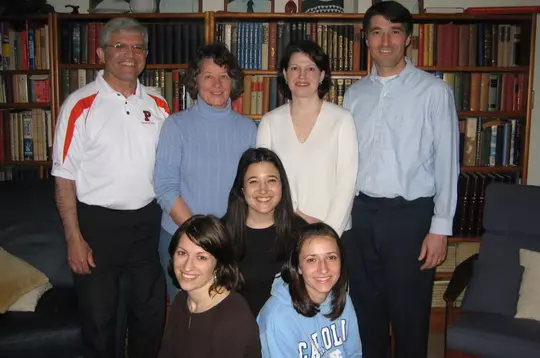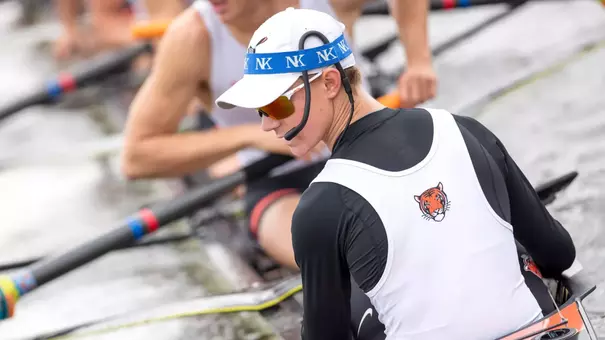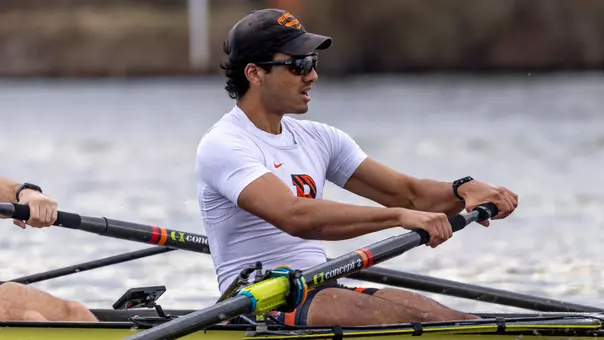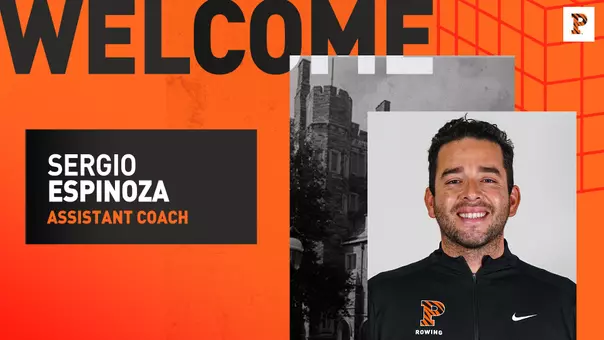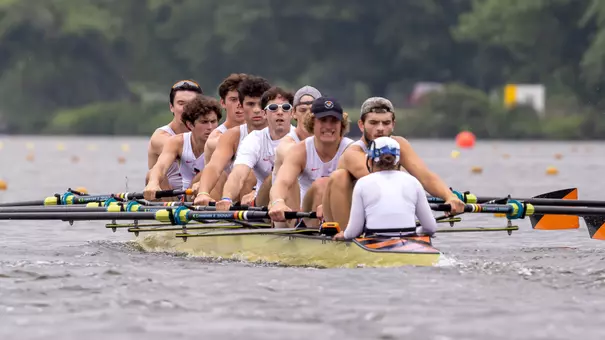Princeton University Athletics
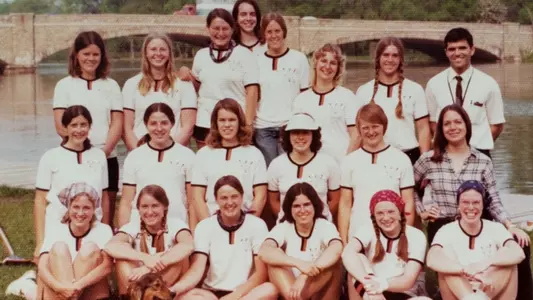
Rowing Celebration Feature: Al Piranian ’69
March 31, 2022 | Heavyweight Rowing, Men's Rowing - Lightweight
Their voices, despite the loving words they say, share a common theme, and that is sadness. It’s there with each positive thought. It’s there every time a chuckle has to be replaced with a tear. It’s there with each pause that breaks up their otherwise happy memories.
Sadness. Unmistakable sadness. It’s impossible to miss. It’s not just any sadness either. It’s a sadness that comes with tragedy, a sadness that grows each moment with the realization that there is nothing that can be done to change what happened.
Al Piranian, a man about whom nobody can find the slightest hint of a bad word to say, is gone. And so all of the happiness he inspired, all of the beauty he brought to the world, all of the times that he reminded those around him what it was they loved about him – all of those things have to take a back seat to the sadness, for now at least.
“He always had a smile on his face,” says Dick Prentke, Princeton Class of 1967 and a rowing teammate of Piranian, who was two years younger. “I never remember him without a smile.”
“He was a very special individual,” says Carol Brown, whom Piranian coached.
“Coach Al Piranian, a selfless gentleman, was more meaningful than any interaction with professors,” says another of his athletes.
“He was a wonderful, principled guy with a great sense of humor, and I just thought the world of him,” says Peter Raymond, who was one year ahead of Piranian. “I can’t say enough good things about him.”
“He was my hero.”
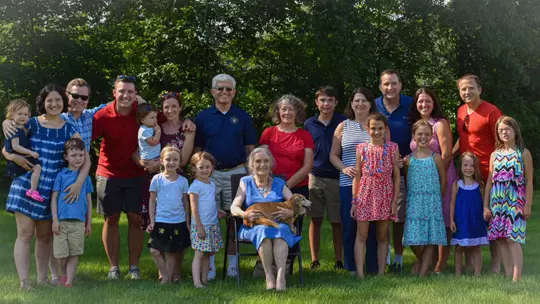
That last one came from Heidi Bauer, who was Heidi Piranian when she graduated from Princeton in 1997. Bauer is one of Piranian’s five children, one son and four daughters. Three of them are Princeton grads – her brother Ed was in the Class of 1996, and her sister Lori was in the Class of 2006. The other two Piranian siblings are Karen, who attended Oberlin, and Lisa, who attended Delaware.
“His mother will be 94 in October,” Bauer says of her grandmother. “His father passed away when he was 97. I thought he had the longevity gene.”
Al Piranian was a Princeton rower, an aerospace engineer with the Navy for 48 years, a licensed pilot for 52 years and one of the heroic figures from the early days of Princeton women’s athletics. On Feb. 24 of this year, Piranian was the passenger in a single-engine Beechcraft Debonair that took off from Doylestown Airport outside of Phiadelphia. Piranian was a flight instructor, and the plane’s pilot was a veteran flier who was working towards a commercial license in order to fly for Angel Flights, an organization that provides free air transportation for medical emergencies.
Their short flight around Bucks County was supposed to end at an airport less than 20 miles away. Instead, their plane never made it, coming to rest instead in a crowded residential neighborhood in Hilltown. The two managed to avoid crashing into any of the houses in the area or the nearby middle school, but both men died on impact.
Al Piranian was 74 years old. He’d been born in Switzerland. He went to Germantown Academy, also outside of Philadelphia.
He left behind his wife, his five children, his 15 grandchildren – and a legion of Princeton rowers whose experiences as Tigers he helped make better. A lightweight rower who never reached the first varsity 8 boat, he was a longtime treasurer of the Princeton University Rowing Association.
He was also the head coach of the women’s rowing team in its infancy.
* * *
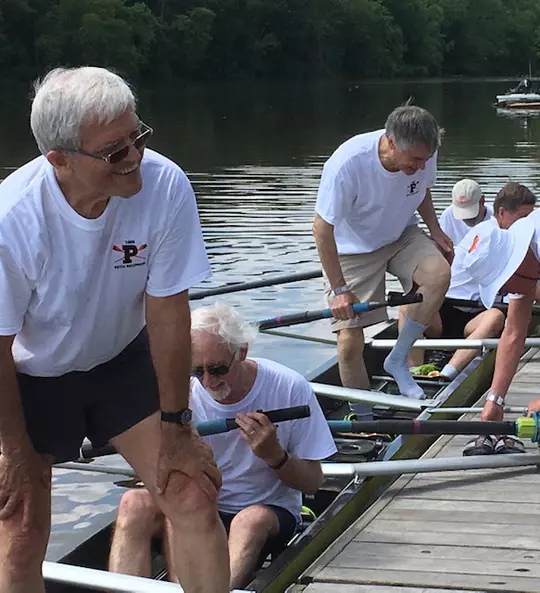
In the world of the first Princeton women’s rowing team, it was always Al Piranian’s birthday. Road trips. Restaurants. It didn’t matter. The first women’s rowers would tell whoever was there that it was their coach’s birthday, and he’d be serenaded with cakes and endless versions of “Happy Birthday.”
“The women,” Raymond says. “They were always giving him birthday parties. He’d just sit there and shake his head.”
Raymond rowed in the 4s in the 1968 Summer Olympic Games and then spent two years in the Navy. With his sights set on the 8s for the 1972 Games in Munich, he came back to Princeton in 1971 to train with Pete Sparhawk, the men’s heavyweight coach at the time.
Jim Rathschmidt had been leading the women’s team in its earliest days, but he turned the reigns over to Raymond in the fall of 1971. When Raymond’s Olympic training got to be all-encompassing in early 1972, he in turn asked Piranian to step in. At the time, Piranian was a graduate student in aerospace engineering.
“He said yes, which blew my mind,” Raymond says. “Then they went out and won the Eastern Sprints. That also blew my mind. I was a very small part of it. That was all Al.”
It was a bit more than just Al. It was a group of determined women who wouldn’t take all the no’s they’d been given as an answer. In fact, it had been Sparhawk who had given them the biggest “no” of all, when he told the first rowing captain, Amy Richlin, that “over my dead body will women row out of my boathouse” in the spring of 1970.
RIchlin, herself something of a force of nature, was undeterred, and by that fall, Richlin had assembled enough women to field a team. She also had the support of the administration. Seeing the writing on the wall, Sparhawk relented, but with one caveat – the women had to practice at 6 a.m.
“We were newbies to Princeton,” Brown says. “We were newbies to the sport. We were so focused on how everyone was saying we can’t row, we’re not allowed in the boathouse, how they men were making our lives miserable. Now here comes this young guy, a grad student, and he shows up and is going to be our coach? The University didn’t even give him a megaphone or rain gear. We had a bake sale to raise money for that. And there he was, every morning at 6 a.m.? Why? He was newly married. He had a kid. And there he was for us. He made a huge sacrifice for us.”
He would coach the Tigers for four seasons. The first one ended with the Eastern Sprints title.
“Al is a really important figure in Princeton rowing history,” says Prentke, who probably knows as much about Princeton rowing as anyone has ever known. “He stepped up to coach the women at a time where under the prior management of the boathouse, that wasn’t a popular thing to do. We’re all embarrassed about the attitude of the heavyweight coach at the time. His views were inconsistent with the future.”
The women also came to the PURA and said that they were going to start their own Friends’ Group to raise money. Prentke, the longtime president, was already involved with the alumni organization even in the early 1970s.
“We had a meeting in Tower Club,” he says. “I remember it like it was yesterday. They came to notify us of their plans, and to my pride, the older members of the board said ‘you’ll do no such thing. You’re part of the rowing association, and there will be only one Princeton rowing. We will support you.’ That gave us what I believe is the first unified Friends’ Group of any sport in the country. That was the easy part. The situation at the boathouse, by contast, was not easy. Al stepped forward and coached the women under trying circumstances. And he was a very successful coach.”
“We learned so much from him,” Brown says. “We learned so much about rowing, and we learned so much about always giving our best.”
The relationship was somewhat like an older brother babysitting his sister and a bunch of her friends. They did everything they could to try to push his buttons.
“It was a tradition in rowing that if you lost, you gave your shirt to the victors at the finish line,” Brown says. “The men had done it forever, and we wanted to continue the tradition. It doesn’t happen now with the unisuits. So we would take off our shirts and be showing off our bras. He just shook his head. We laughed at how he put up with our potty mouths. One time we were on a road trip, and we had to sleep on cots in the gym. He left the room so that we could all change for bed. When he came back in, we’d shortsheeted his bed. Amy once invited him to a faculty dinner at Charter Club. He told her ‘you know Amy, I’m a married man.’ He was a very quiet, solid, straight-laced man. And there we were, this group of crazy women.”
He was more than just their coach. He was, as much as anyone, the one who helped them gain acceptance, by his own willingness to invest in them.
“One of my teammates,” Brown says, “would say that Al was one of very, very few males who respected us, had our backs, treated us well and was one of the very, very few males we could really trust.”
* * *
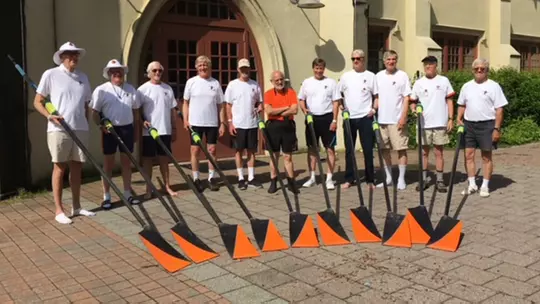
Piranian’s biography is a fascinating one. He earned his bachelor’s and master’s in mechanical and aerospace engineering from Princeton. There’s more. There’s this:
Al devoted most of his professional life to serving his country, in dual capacities both as a Navy civil service employee and as a Naval Reservist. Al began his career as an aerospace engineer for the U.S. Navy by working at the Naval Air Development Center (NADC) Warminster in Johnsville, Pennsylvania in 1967. When NADC closed in 1993 as a part of the federal government's base realignment initiatives, Al continued his work at Naval Air Station Patuxent River until his retirement in 2015. Over his 48-year service as an aerospace engineer working for the Navy, Al worked as a senior aerodynamicist on the design of the F-14, F-18, and the F-35. He was responsible for the airworthiness certification of all stores/weapons carried by the F-14 Tomcat, the Joint Standoff Weapon (JSOW) and the Joint Direct Attack Munition (JDAM) on the F/A-18 Hornet, and also finally on the F-35 (Joint Strike Fighter). He was a member of the NATO Air Armament Working Party and presented internationally. Al also served in the Naval Reserves, drilling at Naval Air Station Willow Grove and achieving the rank of Commander. He also flight instructed in the Willow Grove flying club, and in the last seven years of his life Al continued to pursue his interest in aviation by flight instructing at Doylestown Airport. He logged over 11,000 flight hours with his favorite airplane by far being the T-34B Mentor and was loved by numerous students.
Other pursuits of Al's included a love of classical and choral music, coaching his children's sports teams, serving as a Boy Scouts leader for his son's troop, teaching Sunday school, playing his violin in worship services, and singing in the church choir for many years. He had a great love of history, was a voracious reader, traveled as widely as possible, and enjoyed German cuisine wherever he could find it.
All of that information was contained in his obituary.
“I don’t know anybody who ever said an ill word about Al,” Prentke says. “He was universally well-liked. He maintained a low profile. He was not interested in the spotlight, even when he deserved it. He was a very humble man.”
Raymond calls him “a splendid man.” The two rowed together in the most recent in-person Reunions.
“One of my classmates, Don Marsh, called Al ‘pure gold,’” Raymond says. “That’s what he was. Pure gold. And Don doesn’t say that about many people. Some people, you just know after meeting them for 15 seconds, that they are special. That was Al. I thought he’d be there for the rest of my life.”
Of all those who have been touched by his death, obviously his family has been touched the deepest, especially Jeannette, whom he married in June 1971, just before the army of early Princeton women’s rowers came into their lives.
“I’m still having trouble wrapping my mind around this,” Bauer says. “He was such a great father, such a great grandfather. My dad was modest. He was extremely intelligent. He did not seek credit. He held himself to high standards. If he did something to his exacting standards, he didn’t need the recognition.”
She has endless photos of basically every combination of children and grandchildren in her family, as well as photos of her father in boats, on docks next to boats, on docks next to rowers. As Prentke says, Piranian is smiling in all of them.
In the recent pictures, he smiles out at the world with silver hair and wire-rimmed glasses. In some, he wears a white golf shirt with orange trim and the striped “P,” with “Princeton” written out. Jeannette is standing next to him. Their five children are also in the photo. In the background, on the top of a bookcase, are pictures of the children when they were young. The bookcase is jammed; presumably some of those books involve aviation.
This moment is frozen in time. Sadly, tragically, time for him was more finite than any of them would have dared to think in that moment. Instead, they all join the family patriarch in smiling for the picture.
Now he’s gone, one of the greats of Princeton rowing, one of the heroes of the early days of women’s athletics at Princeton.
He was very much what they all say about him, a good man, a family man, a loving man, a loyal man, a funny man. That’s how they’ll remember him.
The sadness cannot take that away.
— by Jerry Price
